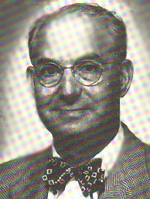Haham Albert J. Amateau, Z"L
Obituary of a 20th Century Sephardic Advocate
 |
1890-1996
Rabbi Albert J. Amateau, 106, Sephardic-Leader Dies
New York Times, February 29, 1996 - Albert J. Amateau, who spent years as a social worker, rabbi, lawyer, Federal official and businessman and still found room for a lifetime of civic and charitable endeavors, died on Feb, 9 at his home in Santa Rosa, Calif. He was 106.
A native of Turkey, where his maternal grandfather settled after being Chief Rabbi of Palestine, Mr. Amateau came to the United States in 1910 and immediately plunged into the swirl of immigrant life in New York.
A descendant of Jews, who were expelled from Spain in 1492 and settled in Turkey, Mr. Amateau, who married the niece of the Chief Rabbi of the Ottoman Empire, was deeply involved in Sephardic affairs in the United States.
Among other things, he worked to draw Sephardic Jews into Jewish life in New York and founded a series of Sephardic fraternal organizations, including one established to support the Turkish Government formed after World War 1. In 1916 Amateau volunteered for the United States Army and served in World War I until 1918. While he was Europe, he was wounded.
One of his more unusual careers began when he was working his way through Cooper Union as a projectionist in a silent movie theater and broke up a fight between two gesturing but silent patrons. Learning they were deaf, he became so intrigued with their plight that after earning a master's degree in social work from Columbia University, he became executive director of the Society for the Welfare of the Jewish Deaf.
Later, after ordination at the Jewish Theological Seminary, he became the first rabbi of a congregation of the deaf, conducting services in sign language.
In an abrupt career switch, he received a degree from the Fordham Law School in 1930 and, while in private practice, was drawn into politics by James Farley, the chairman of the Democratic National Committee. Mr. Amateau founded the Sephardic Democratic Club and directed a voter registration drive among immigrants.
He was later area director of the Federal Wages and Hours Commission for eight states from New Jersey to Louisiana. As head of the American Interracial Council before World War II, he worked to improve, relations between Arabs and Jews at meetings in Geneva and helped renegotiate British quotas for immigration of Jews to Palestine.
After working with Turkish earthquake relief organizations in 1939, he switched careers and coasts, moving to California, where he started a successful dubbing and subtitle service for the Hollywood movie industry, helped found the Sephardic Home for the Aged and led a Rotary Club project to bring Korean heart patients to the United States for cardiac surgery in the 1970's.
In 1992, to commemorate 500 years of peaceful coexistence between Muslims and Jews in Turkey and other Ottoman lands, he helped found the American Society of Jewish Friends of Turkey and was named its honorary president. Amateau wrote a response to the popular Book "La America" which was written about early 20th century Sephardic life in New York.
Mr. Amateau had been kept busy in recent years receiviq honors from Turkish-American organizations. He recently gave the Sephardic Temple in Los Angeles the only possession he had brought with him to the United States more than 85 years ago, a rare Turkish translation of the Hebrew Bible, written in Turkish using phonetic spelling with Hebrew letters.
Mr. Amateau, whose first wife died many years ago, is survived by his second wife, Edith; a son, Rod, of Beverly Hills, two grandchildren and two great grandchildren.
His papers are archived at the Hebrew Union College - Jewish Institute of Religion. The Albert J. Amateau Collection describes the life of Albert J. Amateau as social worker, lawyer, businessman, author, advocate for Sephardic Jewry and a lifelong defender of his Turkish homeland. The collection includes correspondence, a transcript of an oral history interview, autobiographical notes, writings, and materials regarding Palestine and Portugal.

